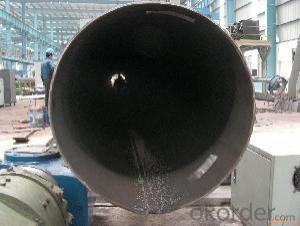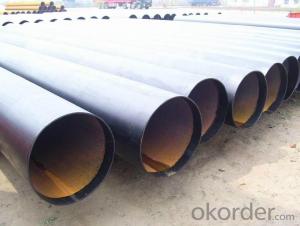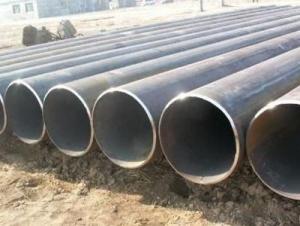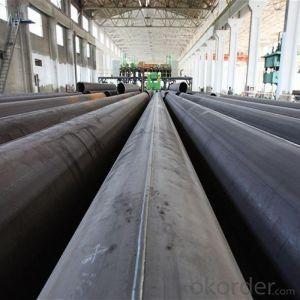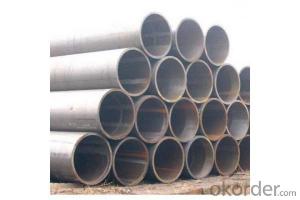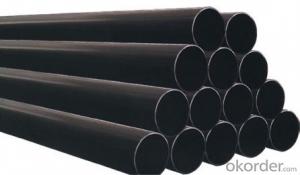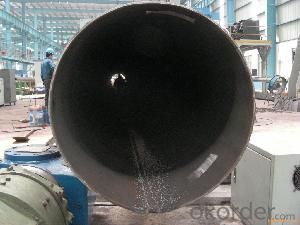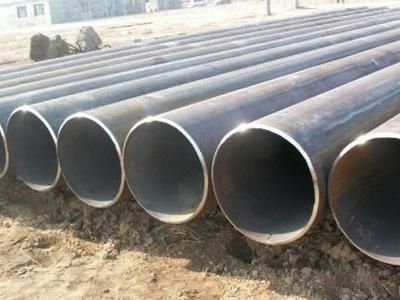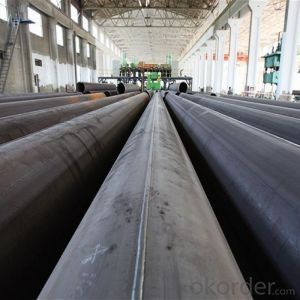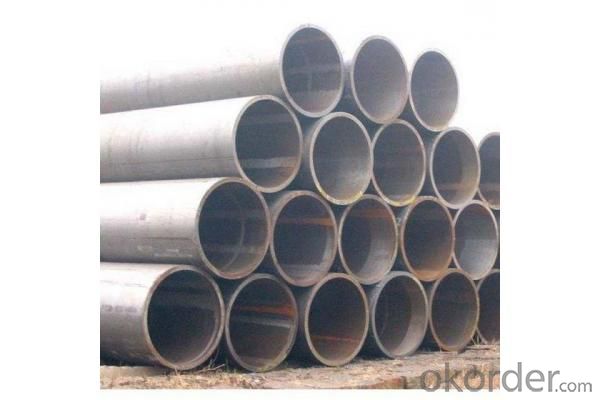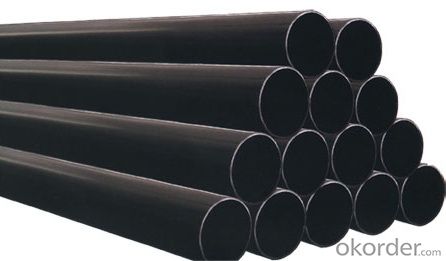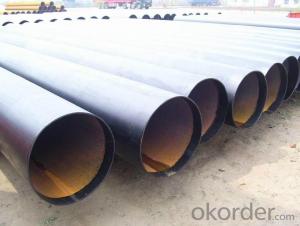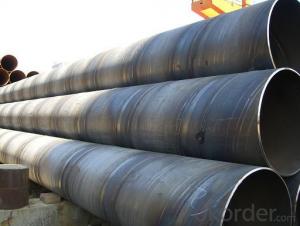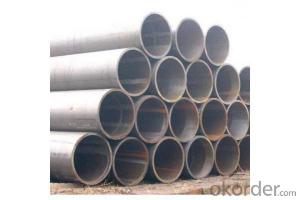API SSAW LSAW CARBON STEEL PIPE LINE OIL GAS PIPE 10''
- Loading Port:
- Tianjin
- Payment Terms:
- TT OR LC
- Min Order Qty:
- 1 m.t.
- Supply Capability:
- 3000 m.t./month
OKorder Service Pledge
OKorder Financial Service
You Might Also Like
Packaging & Delivery
Packaging Detail: | standard export packing or as customer's requirement |
Delivery Detail: | within 10 - 30 days |
Specifications
Spiral Welded Steel Pipes and Tubes
1.Material:Q195-Q235
2.Length:1-12m
3.WT:1.0-14mm
4.O.D.:20-273mm
Spiral Welded Steel Pipes and Tubes
Product Description:
1.Material : Q235,Q345,L245,L290,L360,L415,L450,L485,GrB,X42,46,X52,X56,X60,X65,X70,X80,X100
2,Standard: SY/T5037-2000,GB/T9711-2011,API Spec 5L PSL1/PSL2,ASTM A252\A53,ISO3183,DIN17172,EN10217,JIS G3457,AWWA C200,ASTM A139,ASTM A671,ASTM A672
3.Wall thickness: 3.0mm-30mm
4.Outer diameter: φ168mm-3020mm
5,Length: 5m-12m or as your requirement
6,Corrosion protection standard: DIN30670,DIN30671, AWWAC210, AWWA C203, SY/T0413-2002,SY/T0414-2002
7,Application: Oil, gas, natural gas, water pipe, thermal electricity pipe, steel structure engineering, etc
Q195-q345 Material Steel Pipe's Materials
Elements | Chemical Compsition% | Mechanical Property | ||||||
C% | Mn% | S% | P% | Si% | Yield Point (Mpa) | Tensile Strength(Mpa) | Elongation | |
Q195 | 0.06-0.12 | 0.25-0.50 | <0.050 | <0.045 | <0.030 | >195 | 315-430 | 32-33 |
Q215 | 0.09-0.15 | 0.25-0.55 | <0.05 | <0.045 | <0.030 | >215 | 335-450 | 26-31 |
Q235 | 0.12-0.20 | 0.30-0.70 | <0.045 | <0.045 | <0.030 | >235 | 375-500 | 24-26 |
Q345 | <0.20 | 1.0-1.6 | <0.040 | <0.040 | <0.55 | >345 | 470-630 | 21-22 |
Packaging & Delivery
Packaging Detail: | Normal exporting packing,in container or bulk vessel or as per clients' request |
Delivery Detail: | 2 months after confimed contract |
Specifications
Large Diameter API 5L X70 PSL2 LSAW Steel Pipe
Grade: X42, X46, X50, X52, X60, B, C
OD: 1.5"-28"
WT: SCH10-SCH160
Large Diameter API 5L X70 PSL2 LSAW Steel Pipe
Specifications:
u Standard: API 5L
u Grade: B, C, X42, X46, X50, X52, X56, X60, X65, X70, X80
u OD: 1.5"-28"
u WT: SCH10-SCH160
u Length: 5-12m
u Ends Finish: plain end, bevel end, grooved end
u Surface Treatment: bare, black varnished, oiled finish, red color, anti-corrosion, 3PE, FBE or epoxy coating
u Technique: hot rolled or cold drawn
u Application: api 5l steel pipe for conveying oil, water, gas
u Invoicing: based on theoretical weight or actual weight
u Payment Terms: L/C at sight, T/T or Western Union
u Trade Terms: FOB, CFR, CIF
u Certification: ABS manufacturing assessment, ABS design assessment, API 5CT, API 5L, DNV manufacturer certificate, ISO9001 quality management system certificate, ISO14001 environment management system certificate, GB/T28001 occupational health and safety management system certificate, A1 class manufacturing license of special equipment certificate, CCS, GL, LR, SGS, TüV, PDE
- Q: How do steel pipes compare to other materials, such as PVC or copper?
- Steel pipes have several advantages over other materials such as PVC or copper. Firstly, steel pipes are incredibly durable and strong, making them suitable for heavy-duty applications and high-pressure environments. Additionally, steel pipes have a longer lifespan compared to PVC or copper, as they are less prone to cracking, corrosion, or degradation. Steel pipes also provide better fire resistance and are more resistant to extreme temperatures. However, steel pipes can be more expensive and require professional installation due to their weight and rigidity. PVC pipes, on the other hand, are lightweight, affordable, and easy to install, but they may not be as durable or suitable for certain applications. Copper pipes offer excellent corrosion resistance and are commonly used for water supply systems, but they can be more expensive and require skilled labor to install. Ultimately, the choice between steel, PVC, or copper pipes depends on the specific requirements of the project and the desired balance of cost, durability, and performance.
- Q: How are steel pipes transported and stored?
- Steel pipes are typically transported by loading them onto trucks or shipping containers, while larger pipes may be transported by rail or barge. During transportation, pipes are secured and protected from damage using straps, braces, or foam padding. Once at the storage site, pipes are usually stacked in a designated area, either vertically or horizontally, depending on their size and weight. They may also be stored in racks or on stands to prevent them from rolling or collapsing. Proper storage conditions include keeping the pipes away from moisture, extreme temperatures, and corrosive substances to maintain their quality.
- Q: Are steel pipes fire-resistant?
- Yes, steel pipes are fire-resistant. Steel is a non-combustible material, which means it does not burn or contribute to the spread of fire. Steel pipes have high melting points and can withstand extreme temperatures, making them highly resistant to fire. They are commonly used in various applications where fire protection is crucial, such as fire sprinkler systems, fire hydrant systems, and fire-resistant building structures. Additionally, steel pipes are also known for their durability and strength, which further enhances their fire resistance capabilities.
- Q: How are steel pipes protected during transportation and storage?
- Steel pipes are typically protected during transportation and storage through various measures such as corrosion prevention coatings, wrapping them with protective materials like plastic or rubber, and securing them properly to prevent any damage or movement.
- Q: Can steel pipes be used for conveying solids?
- Yes, steel pipes can be used for conveying solids. Steel pipes are commonly used in industries such as mining, construction, and agriculture to transport various solid materials, including ores, gravel, sand, and grains. The durability and strength of steel make it a suitable material for handling solid substances efficiently and ensuring their safe transportation.
- Q: Can steel pipes be used for conveying hazardous chemicals?
- Certainly, hazardous chemicals can indeed be conveyed through the use of steel pipes. Renowned for their exceptional strength and durability, steel pipes are ideally suited for the handling of various substances, including those that are hazardous. Their ability to withstand both high pressure and temperature ensures the secure transportation of these chemicals. Furthermore, steel pipes possess outstanding resistance to corrosion, a critical factor when dealing with potentially dangerous and corrosive materials. In addition, the ease with which steel pipes can be welded and connected allows for the establishment of a dependable and impervious transport system. Nevertheless, it is imperative to carefully consider the specific requirements of the chemicals being transported and diligently ensure that the steel pipes are appropriately designed, coated, and maintained, thereby averting any potential risks or reactions that may arise with the hazardous substances.
- Q: What is the difference between steel pipes and copper pipes?
- Steel pipes and copper pipes differ in their material composition, durability, cost, and application. Steel pipes are made of an alloy of iron and carbon, providing them with high strength and resistance to corrosion. Copper pipes, on the other hand, are made solely of copper, which offers excellent heat conductivity and resistance to bacterial growth. While steel pipes are more durable and suitable for high-pressure applications, copper pipes are commonly used for plumbing systems due to their malleability, ease of installation, and ability to withstand extreme temperatures. Additionally, copper pipes tend to be more expensive than steel pipes.
- Q: How are steel pipes protected during transportation?
- Steel pipes are typically protected during transportation through a variety of means such as wrapping them with protective coatings, using plastic or metal caps to cover the ends, and securing them with straps or bands to prevent any movement or damage. Additionally, they may be placed in crates or on pallets and secured with stretch film or shrink wrap for added protection.
- Q: What are the safety considerations while handling steel pipes?
- When handling steel pipes, some key safety considerations include wearing appropriate personal protective equipment (PPE) such as gloves, safety glasses, and steel-toe boots to protect against potential injuries. It is important to be cautious of the weight and size of the pipes, using proper lifting techniques and equipment to prevent strains or accidents. Additionally, workers should be mindful of the sharp edges and potential for cuts or punctures, ensuring they have a clear and organized workspace to minimize the risk of tripping or falling. Regular inspections of the pipes for any damages or defects are also crucial to prevent accidents and maintain a safe working environment.
- Q: DN150 welded steel tubes one meter multiple
- Calculated theoretical weight (Kg) per inch of welded steel pipe = (outside diameter wall thickness) * wall thickness * 0.02466DN150 welded pipe, "150" means nominal diameter of 150mm. Its outer diameter is 165mm.
Send your message to us
API SSAW LSAW CARBON STEEL PIPE LINE OIL GAS PIPE 10''
- Loading Port:
- Tianjin
- Payment Terms:
- TT OR LC
- Min Order Qty:
- 1 m.t.
- Supply Capability:
- 3000 m.t./month
OKorder Service Pledge
OKorder Financial Service
Similar products
Hot products
Hot Searches
Related keywords
